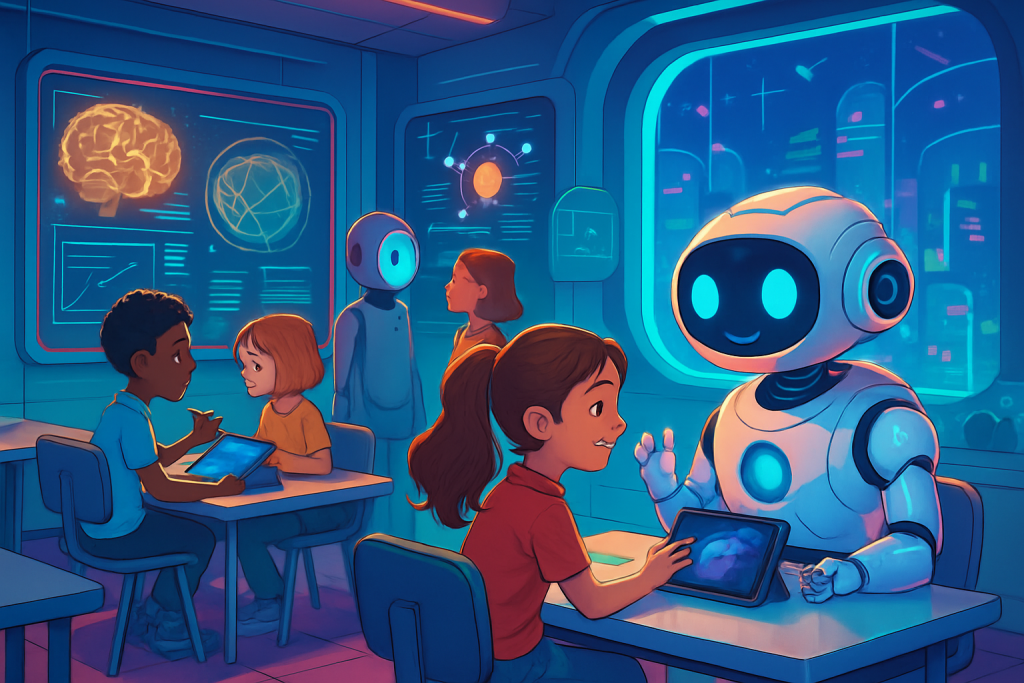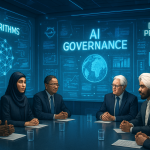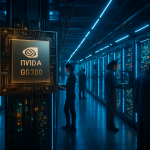Imagine a world where your toddler, fresh out of diapers and babbling about quantum physics, is already lagging behind the silicon-based minds humming in the cloud. Sounds like the plot of a Philip K. Dick novel, right? Well, according to OpenAI CEO Sam Altman, that future might be closer than we think. Speaking at GITEX Global 2025 in Dubai, Altman dropped a bombshell: kids born this year are unlikely to ever outsmart AI. Let that sink in for a moment. It’s not just about machines playing better chess; it’s about a fundamental shift in the intelligence hierarchy.
Now, before you start prepping your offspring for a life of servitude to our robot overlords, Altman insists this isn’t a dystopian nightmare waiting to happen. He’s optimistic, even. He believes humanity will adapt, evolve, and find its place alongside these increasingly intelligent machines. Think of it like the invention of the printing press- it didn’t make humans obsolete, it just changed the game. But the stakes are undeniably higher this time around.
To understand the weight of Altman’s statement, we need to rewind a bit. The AI landscape in 2025 is vastly different from even a few years ago. We’re not just talking about chatbots that can write passable sonnets or generate convincing deepfakes. Models like OpenAI’s GPT-5 are reportedly achieving minor scientific breakthroughs- independently discovering new materials, optimizing complex algorithms, and even contributing to medical research. It’s a far cry from the Eliza chatbot of the 1960s, which merely mimicked human conversation. This is AI actively participating in, and accelerating, the advancement of knowledge. Remember IBM’s Deep Blue beating Garry Kasparov at chess? That was a carefully crafted program designed for a specific task. This is different. This is general intelligence, capable of learning and adapting across a wide range of domains.
Altman projects that by 2026-2027, AI will be driving major progress across the board, from scientific discoveries to practical applications in robotics. Imagine self-driving cars that truly understand nuanced traffic situations, personalized medicine tailored to your individual genetic makeup, or robots capable of performing complex surgeries with superhuman precision. The potential benefits are enormous, but so are the potential risks.
The GITEX Global 2025 event itself offers a glimpse into this AI-powered future. The United Arab Emirates is aggressively pursuing its vision of becoming an “AI-native society.” G42 CEO Peng Xiao showcased some truly mind-bending initiatives, including a 10:1 ratio of AI agents to human employees at G42 and an AI-designed home created using nothing but ChatGPT prompts. Think of it: you could literally ask an AI to design your dream house, from the layout to the interior decor, and then have robots build it for you. It’s like “The Sims” come to life, but with real bricks and mortar.
Of course, all this AI power requires a tremendous amount of energy. Altman and Xiao emphasized the critical role of energy in supporting AI infrastructure, highlighting their collaborative Project Stargate- a massive data center expansion in the UAE designed to meet the growing computational demands of advanced AI systems. This is a crucial point often overlooked in discussions about AI. The insatiable hunger of these models for processing power means that we need to find sustainable ways to fuel them. Otherwise, we risk solving one problem while creating another, potentially even more significant, one.
The implications of Altman’s statement are far-reaching. On an individual level, it forces us to rethink the very definition of “intelligence” and what it means to be human. If AI can outperform us in cognitive tasks, where does that leave us? Do we become mere custodians of these intelligent machines, or can we find new ways to leverage our unique human capabilities- creativity, empathy, critical thinking- to thrive in an AI-driven world? The answer, I suspect, lies in a combination of both.
From a societal perspective, Altman’s words raise serious questions about education, employment, and economic inequality. If AI can perform many of the jobs currently done by humans, what will people do for a living? How do we ensure that the benefits of AI are shared equitably, rather than concentrated in the hands of a few powerful corporations? These are not just abstract philosophical questions; they are pressing policy challenges that demand urgent attention.
And then there’s the ethical dimension. As AI becomes more intelligent, it also becomes more autonomous. How do we ensure that these systems are aligned with our values and goals? How do we prevent them from being used for malicious purposes, such as mass surveillance or autonomous weapons systems? The potential for misuse is very real, and we need to develop robust safeguards to mitigate these risks.
The financial and economic impact is also immense. The AI industry is already a multi-billion dollar market, and it’s only going to get bigger. Companies that can successfully develop and deploy AI solutions will reap enormous rewards, while those that fail to adapt risk being left behind. We can see that the Project Stargate which Altman and Xiao are collaborating on is a large undertaking, but necessary to keep up with the growing energy demands of AI. This trend of investment will continue as AI becomes more powerful and more widely adopted.
Ultimately, Sam Altman’s statement at GITEX Global 2025 is a wake-up call. It’s a reminder that we are entering a new era, an era where artificial intelligence will play an increasingly dominant role in our lives. Whether that era will be a utopia or a dystopia depends on the choices we make today. We need to embrace the potential of AI while also addressing the challenges it poses. We need to foster a culture of innovation while also prioritizing ethical considerations. And, perhaps most importantly, we need to educate ourselves and our children about the power and the limitations of this transformative technology. The future is not predetermined; it’s up to us to shape it. And if we play our cards right, maybe those kids born in 2025 will still have a few tricks up their sleeves.
Discover more from Just Buzz
Subscribe to get the latest posts sent to your email.


